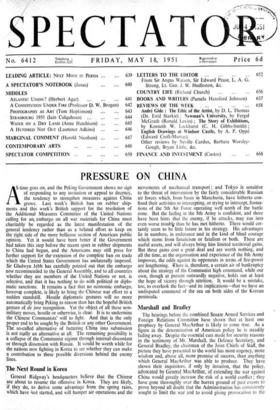PRESSURE ON CHINA
S S time goes on, and the Peking Government shows no sign of responding to any invitation or appeal to decency, the tendency to strengthen measures against China grows. Last week's British ban on rubber ship- ments and this week's British support for the resolution of the Additional Measures Committee of the United Nations calling for an, embargo on all war materials for China must charitably be regarded as the latest manifestation of the general tendency rather than as a belated effort to keep on the right side of the more bellicose section of American public opinion. Yet it would have been better if the Government had taken this step before the recent spurt in rubber shipments to China had begun, and the Americans may still press for further support for the-extension of the complete ban on trade which the United States Government has unilaterally imposed. Sir Gladwyn Jebb has carefully pointed out that the embargo now recommended to the General Assembly, and to all countries whether they are members of the United Nations or not, is selective, and that it has nothing to do with political or diplo- matic sanctions. It remains a fact that no economic embargo, however complete, is likely to bring the Chinese war effort to a sudden standstill. Hostile diplomatic gestures will no more automatically bring Peking to reason than has the hopeful British gesture of de jure recognition. Yet the object of all these non- military moves, hostile or otherwise, is clear. It is to undermine the Chinese Communists' will to fight. And that is the only proper end to be sought by the British or any other Government. The so-called alternative of battering China into submission is not really an alternative at all. The remaining possibility is a collapse of the Communist regime through internal discontent or through dissension with Russia. It would be worth while for the nations now fighting in Korea to see whether they can make a contribution to these possible diversions behind the enemy lines.






































